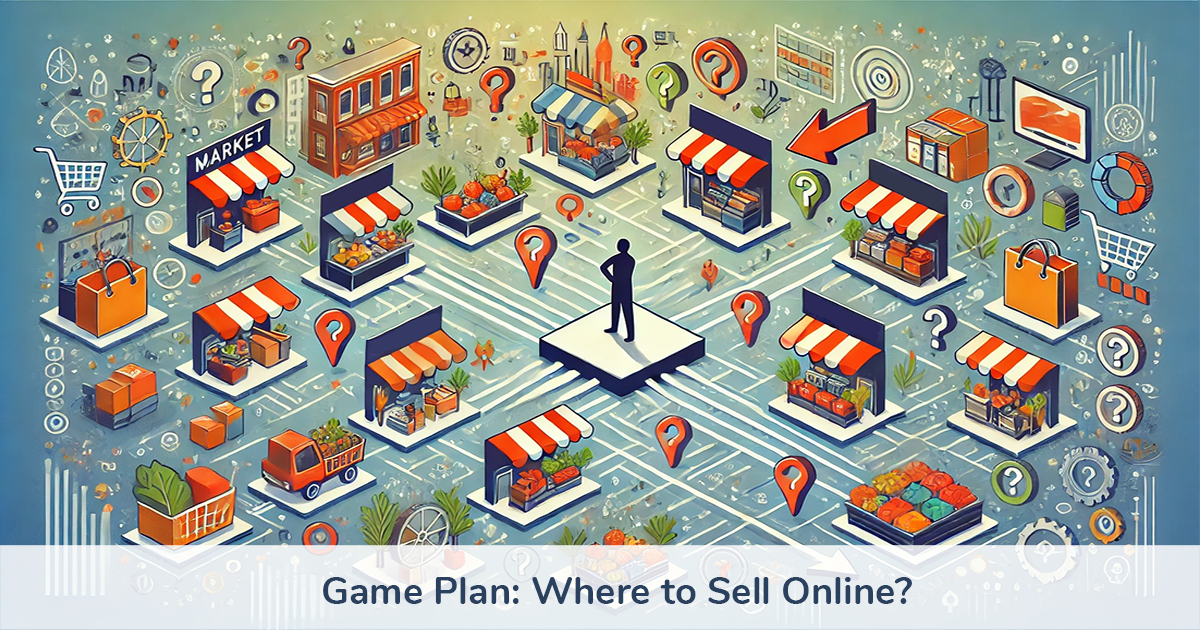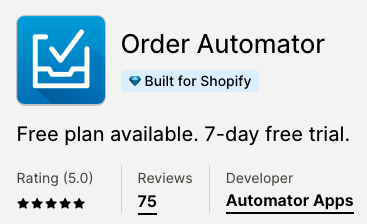
Should You Sell on Shopify or Amazon?
October 26, 2023
Updated August 29, 2024
I've sold products on Shopify, Amazon, eBay, Etsy, and smaller marketplaces. I've been a Shopify focused developer and consultant since 2012, and owned a store for 7 years.
I see this question often - "What marketplace should I sell on (or start on)"
I'm sharing my experience here.
In This Guide
My eCommerce Experience
I've worked with hundreds of Shopify stores, and owned my own store for 7 years. I also started a Shopify optimization and development agency in 2018 that grew to be a prominent Shopify dev and optimization shop recommended by Shopify. I sold my agency and the shares in my store last year (what an adventure!).
That store I owned is a brand called Tree Tribe. I created it in 2015. To date Tree Tribe has planted over 450,000 trees via product sales. I like trees. 🌲😁
At the time I had no audience, just an idea for a lifestyle brand focused on eco friendly materials that plants trees on every sale. I decided to test the idea with the first product, bamboo sunglasses, on Amazon.
I started on Amazon because I had done market research there and saw an opening for quality natural material sunglasses, with good vibes branding that connects with people. I also had a friend selling on Amazon with FBA give me some tips.
The idea was to launch on Amazon to get proof of concept, then create a Shopify store to have a home base and expand the brand.
The Launch
After testing suppliers I ordered the first batch of 400 sunglasses to start production. At this point I was seeing big potential and had a vision of making this a lifestyle brand with sells a variety of products. I decided to bring in a business partner that believed in the idea, to help execute the vision and grow this together.
We launched in May 2015.
By July we sold through our entire stock. 🎉
Next step was order more inventory, expand with more models, and build out a full brand using the Shopify site as a home base.
That journey of 1 bamboo sunglasses product turned into a full line of bamboo and wood sunglesses, clothing, hats, water bottles, and innovative products like leaf leather. Some products succeeded, some failed. We grew an Instagram following, built partnerships, expanded B2B, expanded to different marketplaces, built a team, and had a lot of fun along the way!
I've had a couple other ecommerce stores, 1 dropshipping store I sold for a small amount, 1 dropshipping store I couldn't get any traction. The difference with the successful store is we created products that people wanted, connected emotionally with them (through the mission), and were dedicated to constantly be experimenting to find ways to reach new customers and increase conversion rate for the people that visited our site or listings.
Why Shopify is Better
The main reason is you have your own domain, a home base to build your brand.
Here are some more:
- Create a footprint with search engines
- Have a place for people to find you and contact you (B2B partnerships, sponsorships, etc)
- Share your personality through a blog
- No competition when people are on your site
- Owner of the website, rather than just renting space (like on Amazon, they can be strict about their rules, and often delist or subdue listings based on errors in their automated processes)
- You have more customer data and can build customer lists, utilize email marketing, and control retargeting
- You can't be attacked by competitors like on Amazon (in some markets shady competitors do things like leave fake negative reviews or hijack listings)
- No 3rd party marketplace fees, just payment processing fees and a small monthly fee for the software / hosting / security
- Setting up a Shopify store is quick and easy
Here's a quote, and the type of thing I see often: "I have been selling with Amazon for three years, and I am disenchanted with the way Amazon treats sellers, so I'm looking at Shopify as an alternative."
As a former Amazon seller, I can confirm that while Amazon gives you great opportunities, they can also be frustrating to work with, and often make decisions that are unfair to sellers. This is part of being in a large marketplace.
There are other ecommerce platforms of course, but I've used at least 6 of them in professional projects and to me Shopify is the clear winner. It's a top level ecommerce platform with lots of apps, fully customizable, secure payments with easy setup, a thriving community, and a low monthly price (insanely low for a full ecommerce solution, website hosting, ready made website templates, payment processor, etc.).
Setting up a Shopify store is easy (growing it and marketing is the hard part), and plans start at $20 a month. If you don't have a store yet, take a free test drive here.
Why Amazon is Better
Amazon is the most successful ecommerce marketplace in the world. Lots of people start their search for buying products on Amazon (more than search engines).Here's why Amazon is better than Shopify for selling:
- Amazon gives you a huge audience ready to buy products
- Marketing is easy
- Amazon helps drive traffic to your listings
- Built in fulfillment service (Amazon FBA)
- Higher conversion rates
- Trust. People know they can order on Amazon and Amazon will have their back if the product is no good
For a lot of people that start Shopify stores, they have a hard time getting any sales at all, hard to find customers, hard to figure out where to find the people looking for their products. Amazon makes the early stages of being a new brand easy, focusing more on the product than the brand.
The Game Plan
Sell on both!
Sell on more marketplaces too.
If you're making your own products or private labeling, I would start the focus on selling on Amazon to get some quick customers and proof of concept (if you're testing new products), and create the Shopify site when you know you are all in on the project.
If you are dedicated from the start to build a brand, build the Shopify site while you are prepping your products for Amazon.
One thing I wish I would have done is built the Shopify site, at least at a basic level, before launching on Amazon, to give people a place to check out our brand, sign up to our email list, see who we are.
I also would have included insert cards for people to come to the site and drop their email.
Here's what I would do if starting over again:
-
Set up an Amazon Seller Central account to get the registration process started
-
Get professional product photography and create compelling listings (research best practices and get inspiration from high selling products)
-
Build a pre-launch list of customers to notify when you launch (start with friends and fam). Idea being you want a lot of traffic and reviews when you launch the product, to gain traction that will help organically reach more customers.
-
Set up a quick Shopify site as a home base. Make sure to have an About page, brand messaging to emotionally connect with visitors, and email capture form.
-
For Amazon, I redcommend using FBA (Fulfillment by Amazon) to automate fulfillment and get better rankings.
-
When your products get checked into Amazon FBA and your listing is live, launch your marketing campaign (email list + Amazon ads, etc).
-
Direct all traffic to your Amazon listing(s) to get traction there, that will provide long term organic sales.
-
Include physical insert cards with your website address, contact, and about your brand. Make it compelling and try to get people to comne to your site and enter their email (I'm not up to date on Amazon policies but if you can, include a discount code or a guide, search "email capture strategies" to get ideas).
-
Once your Amazon launch is good, you'll have some data to work with and can start getting feedback and ordering more product / creating add-ons or additional products.
*At this point your Amazon listing will be mostly on auto-pilot, easy to manage. Now you can focus on dialing in your Shopify store.
-
See 7 Shopify Automation Tips to Level Up Your Store, these are proven tactics to help you get more traffic + automate aspects of your business
-
Hire a professional to help dial in your store (designer / developer), test apps, hire a marketer to create campaigns to get people your way.
-
Set up Google Shopping, run Google ads.
-
Experiment with other marketing channels, but know that marketing on social media will be difficult to get a good conversion rate unless you have professional social media marketing experience (best to hire for this).
-
Expand marketplaces. A marketplace could be an everything store like Amazon, Etsy, eBay, or it could be a marketing channel (see Klickly in the article in step 10 above). Some marketplaces will be duds, others will provide a new steady stream of customers and revenue.
-
When you have proven profitable and in-deman products selling on Amazon, scale by setting up an Amazon European account (UK or DE are my favorite). Then from there you can also ship to customers in that region from your FBA inventory, negating the worries of international shipping to those customers. You can set up automatic order routing with Order Automator. Keep expanding to more marketplaces, and watch your business scale up and reach worldwide customers. With this idea in mind, you only need 1 good product to have a successful business (though adding complementary / add-on products is great for cross selling and repeat business).
Some Closing Tips
Always be experimenting, ask for customer feedback, always try to be the best brand you can be to your customers, treat your customers like friends and family, implement their ideas, make them happy, and you will have a successful brand.
If you're selling on Amazon FBA, utilize that fulfillment service to automatically fulfill your Shopify orders. See How to Automate Shopify Order Fulfillment with Amazon MCF / FBA.
If you're not using FBA, or you want to fulfill orders worldwide, you can use 3rd party fulfillment services like ShipBob (I've used a few, ShipBob was my favorite).
Hire out customer support and marketing as soon as you can. It's good to do some of this on your own, to learn your business and market, but customer support will eventually eat up your time, and marketing is best left to professionals, it's a complex and competitive field.
Set a schedule to expand marketplaces. For example maybe you start with Amazon in your home country + Shopify, then next month you experiment with selling 1 product on a large international Amazon market, then next month you try selling a product on Etsy. Some markets will be great some will not, some might sit idle for a bit but then gain traction.
I've had a couple other ecommerce stores, 1 dropshipping store I sold for a small amount, 1 dropshipping store I couldn't get any traction. The difference with the successful store is we created an actual brand and products that customers wanted, had a clear mission, and connected emotionally with people (customers, partners, influencers) to help spread the good energy.
Create a cause for your brand. In my brand we planted a tree for every product sold. Find an organization that fits with your brand messaging that you can donate to, form partnerships. This sets you apart from businesses simply selling products, because you have a higher purpose other than just making money. 🌎✊
Have fun!
🧙♂️ If this post was useful and you'd like to help us out, please check out our apps Order Automator and Product Automator. Our apps help Shopify stores and staff save time and money. 😃
 Author: Joe
Author: Joe


